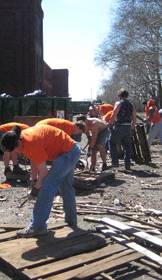More than 120 Princeton student-athletes spent Sunday, April 5, working in conjunction with the Princeton Varsity Club and Isles Inc. on a rebuilding and beautification project titled "Weapons of Mass Construction."
They were helping to renovate a 19th-century textile mill on a 6.5-acre site near the Northeast Corridor rail line in Hamilton Township. The mill eventually will be converted into offices for Isles and other public interest and environmental organizations, a training facility for local youth, condominiums and artists' studios. The environmental challenges and other unique aspects of the mill were addressed in a fall course in Princeton's Department of Civil and Environmental Engineering.
Athletes from nine Princeton teams participated in the project, demolishing interior walls, bathrooms and ceilings as well as outdoor structures; scraping old paint and priming and painting walls; and cleaning up the grounds, and planting flowers and bulbs.
The teams that participated included football, men's and women's swimming and diving, women's basketball, women's hockey, women's squash, women's cross country and track and field, women's tennis and field hockey. Princeton head coaches Roger Hughes (football), Kathy Sell (tennis) and Peter Farrell (women's cross country and track field) also worked on the site, along with swimming assistant coaches Phil Spaniello and Jamie Holder and women's tennis assistant coach Courtney Nagle.

Participants from the women's ice hockey and men's swimming teams prepared to clear the building grounds of debris.
Evan O'Reilly, a 2008 alumnus and former football player, was another volunteer. O'Reilly wrote his senior thesis on the history and development of Isles as a nonprofit community and environmental organization.
Marty Johnson, a 1981 alumnus who played football and baseball, started Isles after graduation as an extension of an undergraduate community service project. Isles remains committed to its mission statement of "fostering more self-reliant families in healthy, sustainable communities."
Among its areas of focus are community planning and research, housing and real estate, youth education and training, financial self-reliance, environmental and community health, and energy and "green" job training.





